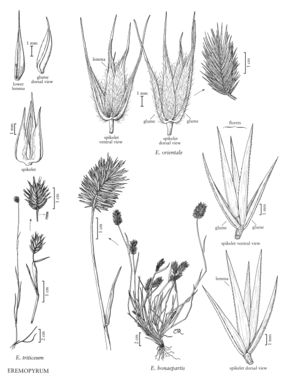Difference between revisions of "Eremopyrum orientale"
FNA>Volume Importer |
imported>Volume Importer |
||
| (3 intermediate revisions by 2 users not shown) | |||
| Line 38: | Line 38: | ||
|publication year= | |publication year= | ||
|special status= | |special status= | ||
| − | |source xml=https:// | + | |source xml=https://bitbucket.org/aafc-mbb/fna-data-curation/src/200273ad09963decb8fc72550212de541d86569d/coarse_grained_fna_xml/V24/V24_365.xml |
|subfamily=Poaceae subfam. Pooideae | |subfamily=Poaceae subfam. Pooideae | ||
|tribe=Poaceae tribe Triticeae | |tribe=Poaceae tribe Triticeae | ||
Latest revision as of 16:23, 11 May 2021
Culms to 15 cm, smooth, mostly glabrous, puberulent below the spikes. Sheaths of upper leaves often somewhat inflated; blades 2-3 mm wide, more or less scabrous on both surfaces. Spikes 1.3-3.5 cm long, 0.9-1.8 cm wide, usually ovate-elliptic; disarticulation at the rachis nodes. Spikelets 7-12 mm long, with 2-3 florets. Glumes 5-12 mm, lanceolate, 3-5-veined, 1-keeled, lateral 2-3 veins prominent, hispid, bases curved, apices gradually tapering to a 0.5-3 mm awn; lemmas 5-12 mm, hispid, hairs 0.5-2 mm, prominently keeled, awned, awns 0.5-4 mm; paleas pubescent between the keels, keels prolonged into 2 toothlike appendages. 2n = 28.
Distribution
N.Y., B.C., Man.
Discussion
Eremopyrum orientale has been collected from southern Manitoba, growing with E. triticeum, and has been reported from southeastern British Columbia and New York. It is not known to be established in the Flora region.
Selected References
None.
